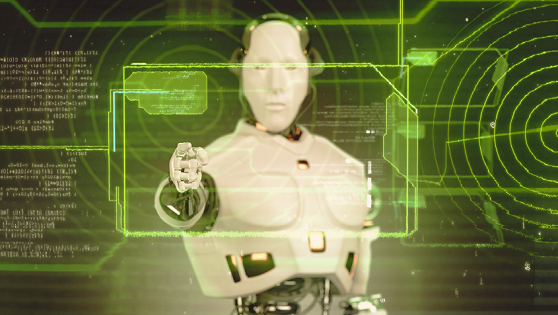
The automotive industry is undergoing a transformation as artificial intelligence (AI) pushes the boundaries of what’s possible. From enhancing driver safety to paving the way for autonomous vehicles, AI has unlocked new opportunities across every aspect of automotive design, manufacturing, and functionality. This article explores how AI is revolutionizing the automotive industry, highlighting key areas of impact, future potential, and the benefits and challenges involved.
Key Areas Where AI is Transforming the Automotive Industry
Enhanced Vehicle Safety and Driver Assistance Systems
AI plays a pivotal role in advanced driver-assistance systems (ADAS), enabling features like lane departure warnings, automatic braking, and adaptive cruise control. These systems use sensors, cameras, and radar to monitor a vehicle’s surroundings, helping to prevent accidents and making driving safer for everyone on the road. The future of AI in ADAS aims to make cars even more responsive, with real-time data allowing them to respond proactively to changing road conditions.
Autonomous Vehicles: The Path to Self-Driving Cars
Autonomous vehicles (AVs) are one of the most anticipated applications of AI. Self-driving cars rely on machine learning algorithms, computer vision, and sensor fusion to interpret the environment and make driving decisions. Major automotive companies and tech firms are investing in AI to advance AV technology, with the goal of creating a future where vehicles can navigate independently, offering a safer and more efficient transportation solution.
Predictive Maintenance and Improved Vehicle Longevity
AI-driven predictive maintenance uses data from sensors and onboard diagnostics to predict potential vehicle failures before they occur. By analyzing patterns in engine performance, tire pressure, and other key metrics, AI can alert drivers to necessary maintenance, reducing the risk of breakdowns and extending the life of the vehicle. This approach saves both time and money while enhancing the driving experience.
Smart Manufacturing and Production Efficiency
AI is optimizing the automotive manufacturing process through automation and robotics. In smart factories, AI-powered robots handle repetitive tasks with high precision, while machine learning algorithms analyze production data to identify inefficiencies and optimize workflows. By improving quality control and reducing waste, AI is helping manufacturers create more reliable vehicles at a lower cost.
Personalized In-Vehicle Experiences
As cars become more connected, AI is enabling personalized experiences for drivers and passengers. AI algorithms analyze user preferences to adjust climate control, seating, and entertainment options, providing a tailored experience each time someone gets into the car. Voice-activated AI assistants also offer convenience by enabling hands-free control over navigation, music, and phone calls, enhancing driver safety and comfort.
Benefits of AI in the Automotive Industry
- Increased Safety on the Roads AI technology significantly reduces the likelihood of human error, which is the leading cause of accidents. With advanced driver assistance and predictive maintenance, AI not only makes vehicles safer but also decreases the risks associated with mechanical failures.
- Cost Savings for Manufacturers and Consumers Predictive maintenance helps consumers avoid costly repairs, while AI-driven smart manufacturing processes reduce production costs for manufacturers. By minimizing downtime and optimizing resources, AI benefits both consumers and producers in the automotive industry.
- Enhanced User Experience and Customer Satisfaction AI’s ability to create personalized in-vehicle experiences leads to higher customer satisfaction, as drivers and passengers enjoy a seamless and comfortable journey. The more AI learns from user preferences, the more tailored and intuitive the driving experience becomes.
Challenges in Implementing AI in the Automotive Industry
- Data Privacy and Cybersecurity Concerns With the growing use of connected and autonomous vehicles, data privacy and cybersecurity have become major challenges. AI systems require data from users, which can create vulnerabilities if not properly protected. Automotive companies must implement robust security measures to protect user data and ensure the safety of AI-powered vehicles.
- High Development Costs Research and development costs for AI technologies in the automotive industry are high, making it difficult for smaller companies to compete. While larger companies can invest in advanced AI research, smaller manufacturers may struggle to keep up, potentially limiting the accessibility of AI-driven features.
- Ethical and Regulatory Issues Autonomous driving brings ethical questions about decision-making in emergencies and regulatory concerns about safety standards. Governments and regulatory bodies need to establish guidelines for AI-driven vehicles, particularly self-driving cars, to ensure public safety and trust in AI technology.
The Future of AI in the Automotive Industry
- The Rise of Fully Autonomous Vehicles Although fully autonomous vehicles are still in the testing phase, the next few years could bring them closer to mainstream reality. Advances in AI, sensor technology, and connectivity will enable cars to operate safely and independently in diverse environments. With ongoing research, AVs could revolutionize transportation by making it safer, more efficient, and accessible.
- Expansion of AI in Electric Vehicles (EVs) AI will play a critical role in managing electric vehicle (EV) systems, from battery management to optimizing charging infrastructure. By enhancing the efficiency and longevity of batteries, AI can help EVs become more reliable and accessible to a broader audience, supporting global sustainability goals.
- Integration with Smart City Infrastructure As smart cities evolve, AI-powered vehicles will become an integral part of urban transportation systems. Connected to intelligent infrastructure, these vehicles will help reduce traffic congestion, improve road safety, and contribute to sustainable urban development.
Conclusion: Shaping the Future of Automotive with AI
AI is at the forefront of transforming the automotive industry, from enhancing safety features and enabling autonomous driving to optimizing manufacturing and creating personalized in-car experiences. As AI continues to evolve, it will unlock new possibilities and reshape the way we think about transportation. By addressing the challenges and implementing ethical, secure AI solutions, the automotive industry can harness AI’s full potential to drive innovation, sustainability, and user satisfaction.


